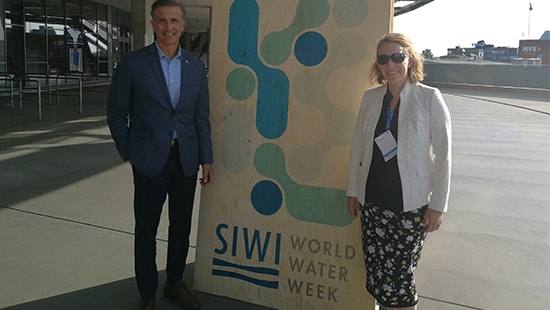Top 5 Takeaways From a Week With World Water Leaders

My recent trip to Stockholm was an opportunity for me to jump into the deep end of our global water challenge with water experts from around the world.
I had the opportunity to represent Ecolab at the Stockholm International Water Institute (SIWI) World Water Week, held each year in Sweden. This annual event brings together leaders and companies from around the world to focus on global water issues in pursuit of a water-resilient world.
Global water stress continues to gain media attention as new cities every year reach their “Day Zero” – when freshwater is no longer accessible -- but what are the leading water minds focused on? To continue the water conversation, I’m sharing my key takeaways from my time at SIWI.
Takeaway 1: Climate = water
Corporations are looking for ways to take a leadership role in the fight to slow the effects of climate change. But while curbing climate change is necessary and urgent, focusing only on prevention will not alleviate the impacts of climate change that continue to materialize.
Climate and water are interlinked. Water itself requires a significant amount of energy to heat, cool, treat and move.
And climate impacts often come in the form of water, from droughts to floods to a water cycle that is no longer able to replenish itself. But solutions to water stress can in turn have an impact on climate change. For example, when countries and municipalities face severe water stress, they look to immediate and (often) energy inefficient solutions such as desalination and shipping water to where it is needed, contributing to a vicious cycle.
While climate change prevention requires a focus on greenhouse gas emissions, adapting to the already changing climate requires a significant, and immediate, focus on water.
Takeaway 2: Acting alone is not an option
Water systems are complex and many companies don’t have a holistic sense of the risks they face related to water or a plan to address those risks. And because water prices largely don’t reflect the supply, demand or quality of water in a geography, water stress can develop with little warning or awareness.
These crises impact everyone. That’s why companies leading the way in water stewardship need to continue to educate others (particularly neighbors in high-stress watersheds) about the opportunities and benefits of reducing water use and contributing to the health of shared watersheds.
Takeaway 3: The economic benefits are there
It may sound expensive to implement new processes designed to improve water management. Over time, however, these changes pay for themselves. At face value, water is cheap, but heating, cooling, moving and treating that water can require a lot of energy, which can have a significant impact on a company’s bottom line. But there is still some skepticism around the payback. By implementing tools to better understand and track savings generated by water projects, companies can make the economic case for strategic water management.
Takeaway 4: Context is key
The global statistics around water stress can be staggering. But those statistics may not ring true for an individual facility or business. Why? Because the local context surrounding your operations determines so much about your water management. What’s going on in your local watershed? Where are you getting your water from? Who else is using the same water sources? What’s the water quality? How about local regulations and governance?
When assessing the state of water use, businesses need to look at how their operations fit into the local context and work with a variety of stakeholders to set a smart water strategy.
Takeaway 5: Investors will push us all to be better
Financial sector attendees were a notable force in conversations. Financial institutions are increasingly interested in the risks that businesses face when it comes to water. With more scrutiny from the financial sector, organizations will be expected to have a better understanding of their water footprint and how they are working to reduce water use.
These takeaways represent a small fraction of the dialogue at SIWI World Water Week. There’s plenty of work to do to protect our world’s water supply, but I feel inspired and motivated by the effort and collaboration I’m seeing every day. Together, I know we can create a ripple effect and transform industry’s approach to water.


